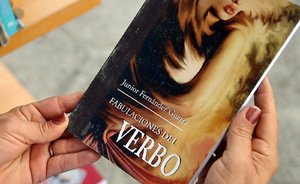Junior's fables with history / Fabulaciones de Junior con la historia (eng-esp)
Hello, friends of literature.
Nowadays, in a country where rhymed verse has lost and is losing more and more space (perhaps due to prejudice, perhaps due to ignorance, perhaps due to both), it's refreshing to come across a book like Fabulaciones del verbo, Sanlope Publishing, 2015, by the writer Junio Fernández Guerra.

Fabulaciones is the debut work of this young writer, who would later win the Calendario Award in the Children's Poetry category with another book of a similar style. With Fabulations of the Verb, Junior presents us with a book divided into three thematically and structurally distinct sections: Abstraction of the Stone of Sanity, The Bearable Need of Being, and The Flowers of the Sea.

While Junior fabricates with the self, as a kind of interior monologue or conversation with that other reader about loneliness, sex, desire, abandonment, or, simply, love and heartbreak in this first part as the central theme, this is something we can find in the rest of the work.
But, beware, this is not a romantic book at all.
Junior has the need to fabricate, to philosophize: Junior wants to tell us something.
To do so, he does it in the best way he knows how, and that is through literature; poetry in particular. This gives him the opportunity to display an exquisite, erudite language, allowing him to intelligently interplay words and images that enrich the verses. In addition to language, the quintessential king of this book, Junior adds depth to the texts with suggestive titles for the poems, playing with biblical references, scenes from Greek mythology and culture, poems, poets, etc.
This is a good part of the main attraction of this book (aside from the experimentation and risk), which lies in the interplay of humor, language, and references. The poem titles give us a synopsis of what we'll find: *Mata Hari ecstatic before the firing squad while Death performs the Dance of the Seven Veils; *The Tenth Muse in the Pool of the Nymphs; *Donatien's Last Delirium at Charenton (asleep between Constance's legs); *Elegies of the Bard (or any incestuous bipedal silhouette); Exodus 19:94, among many others just as suggestive.
Junior Fernández didn't want to write a simple, straightforward, or simple book. This is evident from the first page. He took risks by choosing complicated themes to develop in an original, different way; using sophisticated, erudite, multi-referential, modern, and fresh language, with touches of irony and dark humor; perhaps even critical at times.
That wasn't enough for the author, and he went further.
In a land where the décima is the queen of poetry, Junior wanted to take a risk and play "in the house of the top."
And he played with structure, with form. He took the espinela décima, the avant-garde décima, the sonnet, and did what he felt was necessary to convey his message.
But it wasn't enough.
The octosyllabic verse, the hendesyllable, and the traditional form he used in several of his poems weren't enough. Some of his texts required a different structure, and he broke it and adapted the form to the content. He wrote what might seem like free verse, poetic prose, and even epigrams to the reader less familiar with rhymed poetry.
However, they are décimas.
Octosyllabic, hendecasyllabic, and even three- and five-syllable décimas. In the case of Fabulations of the Verb, the form doesn't generate content, but quite the opposite.
As if that weren't enough, experimentation with language, themes, and the structure of the décima wasn't enough. Junior needed to go further, to explore the sonnet, and he wrote (in addition to traditional sonnets) something that could be called a "sonnetésima," as the writer Eduardo Rosell says.
At the beginning and end of the second part, Junior wrote two sets of seven décimas each within the structure of five sonnets. If it's difficult to create a good décima or a good sonnet, modern, fresh, with an interesting message, imagine combining both poetic compositions, each one functioning individually and as a whole.

Fabulaciones del verbo is a book that must be read by lovers of rhymed poetry and, above all, by those who affirm that structure, rhyme, is a "straitjacket" for both content and language. This book demonstrates that young people from Las Tunas, Cubans, are writing good contemporary poetry that is modern, interesting, experimental, and transgressive. And, at the same time, they remain faithful to classical forms, without renouncing history and our cultural heritage.
Junior Fernández Guerra is a clear example of this.
The book is an immense story, a fable, and, as such, always carries a lesson, a message, something that won't leave you indifferent, whether after reading any of his poems or after finishing the book.
Fabulaciones is a lesson, proof that if we step out of our comfort zone, if we take risks, we can create masterpieces on our island. Works like this one, which fill us with inspiration and leave us wanting to continue creating stories forever and ever.
Versión en español
Hola, amigos de la literatura.
Hoy en día, en un país donde el verso rimado ha perdido y pierde cada vez más espacio (quizás por prejuicio, quizás por desconocimiento, quizás por ambos), es fresco encontrarse un libro como Fabulaciones del verbo, Editorial Sanlope, 2015 del escritor Junio Fernández Guerra.

Fabulaciones es la ópera prima de este joven escritor, quien luego ganaría el premio Calendario en la categoría de Poesía infantil con otro libro de similar estilo. Con Fabulaciones del verbo, Junior nos presenta un libro dividido en tres secciones bien marcada temática y estructuralmente: Abstracción de la piedra de la cordura, La soportable necesidad del ser y Las flores del mar.

Si bien Junior fabula con el yo, como especie de monólogo interior o conversación con ese otro lector sobre la soledad, el sexo, el deseo, el abandono o, simplemente, el amor y el desamor en esta primera parte como eje temático, esto es algo que podremos encontrar en el resto de la obra.
Pero, ojo, no es para nada un libro romántico.
Junior tiene la necesidad de fabular, de filosofar: Junior quiere contrarnos algo.
Para eso lo hace de la mejor manera que conoce y es con la literatura; en especial, la poesía. Esta le brinda la posibilidad de lucir un lenguaje exquisito, erudito, que le permite realizar un juego inteligente de palabras e imágenes que enriquecen los versos. Además del lenguaje, el rey por excelencia de este libro, Junior le agrega profundidad a los textos con sugerentes títulos a los poemas, jugando con referencias bíblicas, a escenas de la mitología y cultura griega, poemas, poetas, etc.
Esto es buena parte del atractivo principal de este libro (amén de la experimentación y el riesgo) se encuentra en el rejuego del humor, el lenguaje y las referencias. Los títulos de los poemas nos brindan una sinopsis de lo que encontraremos: Mata Hari extasiada ante el pelotón de fusilamiento mientras la muerte interpreta la danza de los siete velos, La décima musa en el estanque de las ninfas, Último delirio de Donatien en Charenton (dormido entre las piernas de Constance), Elegías del bardo (o cualquier silueta bípeda incestuosa), Éxodo 19,94, entre muchos más así de sugerentes.
Junior Fernández no quiso escribir un libro cómodo, sencillo, simple. Eso se nota desde la primera página. Fue arriesgado al elegir temas complicados de desarrollar de una forma original, diferente; el uso de un lenguaje alto, erudito, multireferencial, moderno, fresco, con toques de ironía y humor negro; talvés, hasta crítico en ocasiones.
Al autor no le bastaba eso y fue más allá.
En una tierra donde la décima es la reina de la poesía, Junior quiso arriesgarse y jugar “en casa del trompo”.
Y jugó con la estructura, con la forma. Tomó la décima espinela, la décima de vanguardia, el soneto, e hizo lo que sintió que era necesario hacer para transmitir su mensaje.
Pero no le bastó.
No le bastó el verso octosílbo, el endecsílabo y la forma tradicional que utilizó en varios de los poemas. Algunos de sus textos exigían otra estructura, y él la rompió y adaptó la forma al contenido. Escribió lo que podría parecer verso libre, prosa poética e incluso epigramas para el lector menos conocedor de la poesía rimada.
Sin embargo, son décimas.
Décimas octosílabas, endecasílabas y hasta de tres y cinco sílabas. En el caso de Fabulaciones del verbo, la forma no genera contenido, sino todo lo contrario.
Por si fuera poco, no era suficiente experimentación con el lenguaje, con la temática, con la estructura de la décima. Junior necesitaba ir más allá, ir al soneto y escribió (además de sonetos tradicionales) algo que podría llamarse “sonetésima”, como dice el escritor Eduardo Rosell.
Al inicio y cierre de la segunda parte Junior escribió dos conjuntos de siete décimas, cada uno, dentro de la estructura de cinco sonetos. Si es difícil crear una buena décima o un buen soneto, moderno, fresco, con un mensaje interesante, imagínense mezclar ambas composiciones poéticas, que funcionen cada una de forma individual y como un todo.

Fabulaciones del verbo es un libro que necesita ser leído por los amantes de la poesía rimada y, sobre todo, por los que afirman que la estructura, la rima, es “una camisa de fuerza” ya sea para el contenido como para el lenguaje. Este libro es la muestra de que los jóvenes tuneros, los cubanos, están escribiendo buena poesía contemporánea, moderna, interesante, experimental y transgresora. Y, al mismo tiempo, siguen siendo fiel a las formas clásicas, sin renegar de la historia y nuestro patrimonio cultural.
Junior Fernández Guerra es un ejemplo claro de esto.
El libro es una inmensa historia, una fábula y, como tal, siempre trae una enseñanza, un mensaje, algo que no te deja indiferente, ya sea luego de leer cualquiera de sus poemas o luego de terminar el libro.
Fabulaciones es una clase, una prueba de que, si salimos de esa zona de confort, si nos arriesgamos, podemos crear obras maestras en nuestra isla. Obras como esta, que nos contaminan y nos dejan con ganas de seguir fabulando por siempre y más.
Congratulations @abelarte! You have completed the following achievement on the Hive blockchain And have been rewarded with New badge(s)
You can view your badges on your board and compare yourself to others in the Ranking
If you no longer want to receive notifications, reply to this comment with the word
STOP¡Estupendo hayas traído acá, creo que es la segunda ocasión en que vemos su referencia, a un grande de nuestras letras!
¡Y como siempre, de modo magistral!
Leer a Yunior es imprescindible. ¡Gracias!
!Sloth
!MMB
!STRIDE
!HUG
!INDEED
!WEIRD